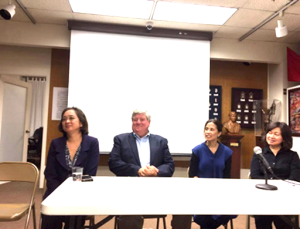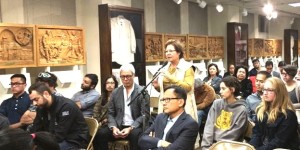Fil-Ams told that PH wealth in wildlife needs urgent care

Author Almira Astudillo Gilles (right) signs a copy of her book for environment advocate Conchita Lopez Taylor. PIA LOPEZBANOS-CARRION
SAN FRANCISCO — “There is nothing more magical than taking a child into the water with a mask to see the world under,” said Dr. Terrence Gosliner, senior curator of Invertebrate Zoology of the California Academy of Sciences, describing the diverse and colorful life underwater in the Philippines.
Gosliner spoke at the recent book launch of Hotspot, Cool Country: Biodiversity in the Philippines by Filipino American author Almira Astudillo Gilles.
“Inflatable sharks, frogs that fly, metal-eating plants, cicadas that laugh” are just a few of the unique species that can be found in the Philippines.
Gosliner reported that there are 9,253 species of plants, 535 species of birds, 281 species of freshwater fish, 245 species of mammals found in the country, to name a few. These numbers constantly change because many new species are being identified, while others could vanish or become extinct.

Panel of experts (left to right): Atty. Ipat Luna, Terrence Gosliner, Ph.D., Roberta Lopez Feliciano and Almira Astudillo Gilles echo the pride and awe for the biodiversity of the Philippines. PIA LOPEZBANOS-CARRION
The book launching, held at the Social Hall of the Philippine Center in San Francisco, was supported by the Philippine American Writers and Artists (PAWA), Inc./Filipino American Book Festival, California Academy of Sciences, SEA Institute, Pusod, Inc., ABS-CBN Bantay Kalikasan/Lingkod Kapamilya Foundation, Inc. and the Philippine Consulate General of San Francisco. ABS-CBN The Filipino Channel (TFC) provided full media support for the event. The talk was emceed by Edwin Lozada from the Board of Directors of PAWA.
Unique biodiversity
Hotspot, Cool Country, a picture book, features the Philippines’ unique wildlife and marine life, which are among the most at risk on the planet. The book shows that the Philippines is megadiverse, meaning it has more species concentrated in its territory than other countries, making it “cool.” At the same time the dangers facing wildlife makes it a “hot” spot.

From left to right: Director of Science Integration and Operations at the California Academy of Sciences (CAS), Pusod, Inc. President & Member of the Board of Advisors, SEA-VIP Institute Dr. Meg Burke; SEA-VIP Institute Treasurer Raymundo “Ting” Feliciano; Pusod, Inc. Co-Founder Malou Babilonia; and SEA-VIP Institute Chairman Roberta Lopez Feliciano. NERISSA FERNANDEZ
“Cool country is a good thing because there are new species being discovered every day in the Philippines. But being a hot spot is not a good thing. That means it is vulnerable to species extinction. The need for conservation is urgent,” Astudillo-Gilles said.
Gilles says, “There is no book right now that introduces students to the natural wonders of the Philippines” and instills pride in them. Her book was written to fill this need.

Philippine American Press Club-USA President Esther Chavez of INQUIRER.net asks a question during the Q & A portion at the book launch held at the San Francisco Consulate. NERISSA FERNANDEZ
Panelists identified the Verde Island Passage (VIP) as key center of biodiversity. It is approximately 1.14 million hectares of seascape stretching between the provinces of Batangas, Occidental and Oriental Mindoro, Marinduque and Romblon.
Richest part of PH
“The Verde Island Passage is the richest part of the Philippines,” stated Gosliner.
His colleague, Rich Mooi, director of Citizen Science, California Academy of Sciences, also said, “The diversity of the species completely blew me away. I’ve never been anywhere on a planet that was even remotely like that.”

A wealth of unique species of animals can be found in the Verde Island Passage (VIP) that is why it is called “the center of the center” of marine biodiversity. SEA INSTITUTE
The throbbing, thriving life in this region has led experts to call the VIP the “center of the center” of biodiversity. It is also threatened by technology, industry, overdevelopment and pollution.
Astudillo-Gilles’ book reveals that “there is a race between species extinction and discovery. The Earth is now losing species at the fastest rate since the disappearance of dinosaurs. That is why it is imperative to protect identified hot spots. It is important to safeguard and preserve this very important stretch that is the VIP.”
Roberta Lopez Feliciano, chairman of the SEA-VIP Institute (Science, Education and Advocacy), which promotes science-based conservation in the Verde Island Passage, is setting up systems and processes to bring together government, NGOs, businesses, the academe and local communities to align research, educational outreach and conservation efforts.
A little goes a long way
Feliciano believes that “every little ripple of action goes a long way.” She is convinced that “you can’t really care about the environment unless you experience it first-hand. That is why the SEA-VIP Institute wants to bring science into people’s lives.”
Similarly, Atty. Ipat Luna, environment activist and president of Pusod, Inc. an environmental non-profit organization in the Philippines, stressed the importance of encouraging Fil-Ams to go to the Philippines “to see and experience what it is they are trying to protect.”
“Until someone is able to link what he or she is eating to environment conservation advocacy, that person will not give a sustained commitment,” she contended.
In this light, various groups in the Philippines are putting conservation measures in place. Feliciano reported that Philippine Department of Environment and Natural Resources Secretary Gina Lopez, has marked 17 hot spots in the country to serve as models on how nature can be protected in other areas.














